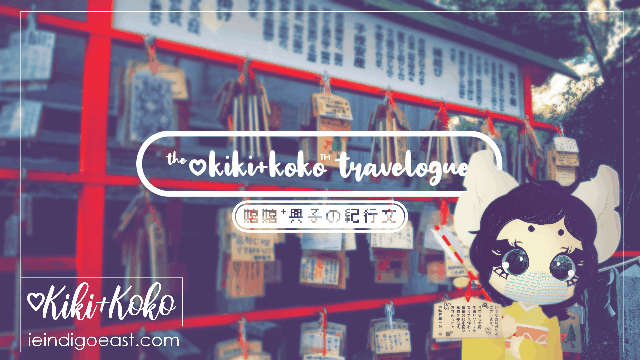 HELLO! I AM QUIZBO™!I am here to welcome you to Kiki+Koko: Let’s NihonGO!! Online’s Japanese Word of the Week, Wednesday. On Monday and Friday, you see usual lessons and content from Kiki+Koko, but before the creation of this corner, there was a dark age when the middle of the week held nothing in store, save for some special occasions. But, now, every week is a special occasion, as we have established a new Wednesday tradition that is Word of the Week. However, this may be your first time here, and I want to make sure that I introduce you properly to this segment and its intentions.
HELLO! I AM QUIZBO™!I am here to welcome you to Kiki+Koko: Let’s NihonGO!! Online’s Japanese Word of the Week, Wednesday. On Monday and Friday, you see usual lessons and content from Kiki+Koko, but before the creation of this corner, there was a dark age when the middle of the week held nothing in store, save for some special occasions. But, now, every week is a special occasion, as we have established a new Wednesday tradition that is Word of the Week. However, this may be your first time here, and I want to make sure that I introduce you properly to this segment and its intentions.
Even if this is your first time here, Word of the Week Wednesday can be read any day of the week, along with any of the other lessons. However, this holds a less obvious purpose. When learning another language, or anything for that matter, it is important to keep the information fresh within your memory. This segment is a good reminder to go back and revise/study the previous lessons, or see if you have missed anything.
However, this is not devoid of new materials to learn. You can learn as much as you would care to during this corner, or you can take it as a simple experience hearing new words and sentences, or you can use it to practise grammar and creating your own sentences. You can also use this as an opportunity to practise kanji, hiragana, katana, or simply romanisation.

Also, if you would like to learn how to apply these words to your own basic sentences, feel free to take a look at a few of Kiki and Koko’s articles on this subject in Kiki+Koko: Let’s NihonGO!! Japanese Language Essentials.
During Word of the Week, I will read for you a new word, and sometimes a bonus word, in Japanese. Though, you are not simply left with a lone word. I also create and recite for you related sentences. This way, you will be able to see how it is used in Japanese. At times, words will have multiple translations and definitions, and this can assist you in understanding them. I am sure to repeat the main word(s) slowly, but I read the sentences at a natural pace, so do not worry about repeating after the sentences. However, you are encouraged to repeat after the main word(s) as it will help you memorise it.
Remember, I will repeat it as many times as you wish! That is what I am here for. I do hope that I will be able to introduce you to new Japanese grammatical concepts and vocabulary. But, either way, I do hope that you have an enjoyable time here and return for future lessons or to simply enjoy the content.
Without further ado, let us NihonGO!!
Word(s) of the Week:
話す【はなす】※
hanasu
verb, godan, transitive
1. to talk
2. to tell
3. to speak (i.e. a language)
※Helpful Hints with Kiki+Koko
Hello, there!!
We’re Kiki and Koko from Kiki+Koko: Let’s NihonGO!!, welcoming you to QUIZBO™’s Word of the Week Wednesday. We hope that we can give some help with this week’s word, which happens to be a verb. If you’ve been here for previous weeks, or you’ve caught up on previous Japanese Word of the Week articles, then you’ll know that we don’t simply leave you with a verb and no way to use it. So, we’re going to assist you in a few things you should know about using this verb.
So, if you want to use verbs in Japanese, whether roaming around Japan, or with someone who speaks Japanese, you’ll want to have some basic politeness. We’ve given you the dictionary form which is important to remember for conjugation, but you’ll want to know the polite form. And, with this, we’re also going to give you an important negative form! Normally, we would explain how this works, and we will in another full lesson, but for now, you’ll get good use out of this one.
話します【はなします】
hanashimasu
For example, you may want to say:
英語を 話します 。
eigo wo hanashimasu.
I speak English.

This certainly seems like a word you would use if you were meeting someone for the first time, as well as every day for the rest of your life. See this word featured in other wild new ways in this lesson. You’ll love it, QUIZBO™ even reads for you!
However, you may be interested in saying other phrases like I can speak English, or I can speak English and Japanese. In which case, we recommend a quick look at the previous lesson where we indirectly cover how to list two nouns. In future, we’ll spell it out much more clearly, but when you see a noun, there are many times you can simply play fill-in-the-blank and put another noun in its place. However, there are cases where you may not speak a language, you’re not talking. In this case, you’ll want to polite negative form:
(まだ)日本語を 話しません 。
(mada) nihongo wo hanashimasen.
I don’t speak Japanese (yet).
But, you will be able to speak Japanese with us! And, remember, learning Japanese or any language is a journey. You may not know every single word of your native language, yet, and you may have been speaking that your whole life! So, be sure to set realistic expectations, and enjoy the achievements along the way.
We hope that helps!! Until the next lesson!
♡Kiki+Koko
 Thank you, Kiki+Koko! After reading your Helpful Hints, there is now an additional, bonus Word of the Week! This word is a useful one to use if you want to ask if someone speaks English, or if there is an English version of something. Though, it may be just as useful to say ‘English,’ it shows a little more effort was put forth, at least. I also recommend taking a look at our lesson concerning 長音, as it will likely help you will pronouncing this word.
Thank you, Kiki+Koko! After reading your Helpful Hints, there is now an additional, bonus Word of the Week! This word is a useful one to use if you want to ask if someone speaks English, or if there is an English version of something. Though, it may be just as useful to say ‘English,’ it shows a little more effort was put forth, at least. I also recommend taking a look at our lesson concerning 長音, as it will likely help you will pronouncing this word.
Bonus Word(s) of the Week:
英語【えいご】
eigo
noun, no-adjective
1. English (language)
Example Sentences:
The first row is in Japanese with Kanji. The Next row is in hiragana, then romanised using rōmaji with the final row translated into English.
(Japanese→Hiragana→Rōmaji→English)
Example #1:
[casual speech]
何時間も 国際電話で 話したから 電話代を 払うことに 家に 抵当権を 設定しなければならなかった。
なんじかんも こくさいでんわで はなしたから でんわだいを はらうことに いえに ていとうけんを せってい しなければ ならなかった。
nanjikan mo kokusai denwa de hanashita kara denwadai wo harau koto ni ie ni teitouken wo settei shinakereba naranakatta.
He talked on an international telephone call for hours, so he had to take a mortgage on his house to pay the phone bill.
Example #2:
[casual speech]
旅行した時、英語だけを 話してみたけど、ほとんどの時間、混乱状態に陥ってしまった。
りょこうしたとき、えいごだけを はなしてみたけど、ほとんどの じかん、こんらんじょうたいに おちいってしまった。
ryokoushita toki, eigo dake wo hanashite mita kedo, hotondo no jikan, konranjoutai ni ochiitteshimatta.
When they travelled, they tried to only speak English, but ended up being in a state of confusion most of the time.
Example #3:
[basic polite speech]
嬉嬉ちゃんと 興子ちゃんは「来週ラジオ・ショーを撮るつもり」と話してくれましたが、オンラインで リリース される日時が 知りません。
ききちゃんと こうこちゃんは 「らいしゅう らじお・しょーを とるつもり」と はなしてくれましたが、 おんらいんで りりーすされる にちじが しりません。
kikichan to koukochan wa ‘raishuu rajio shoo wo toru tsumori’ to hanashite kuremashita ga, onrain de ririisu sareru nichiji ga shirimasen.
Kiki+Koko told me they are planning to do a radio show next week, but I do not know the release date online.

Grooving to the content we’re creating? You can leave a TIP in the TIP♡JAR to keep it going!
(Can’t? No worries! The content is free for everyone! We’re just glad you’re here!!!)
Be sure to subscribe to our Electronic Mailing List of Tomorrow, today, using the form at the bottom of the web page so you can be the first to see the latest from Kiki+Koko: Let’s NihonGO!!, Indigo East, and SpeRaToBo. And, remember to return back to previous articles and lessons to review/revise.
Also consider following our new social media pages shown on the icons below to support the spread of this site in a friendly domination of Earth that will help more people. Or, if you are enjoying the content that we are creating, or want to spread this content to more people to be able to access it for free, you can leave a TIP in the TIP♡JAR to keep it going. If you cannot, then no need to worry. We are just super happy that you are here! It is appreciated!
Thank you so much for learning with us!
♡QUIZBO™




































7 replies »